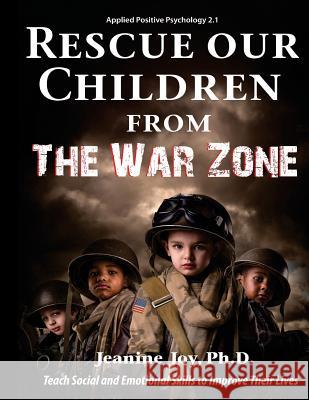Rescue Our Children from The War Zone: Teach Social and Emotional Skills to Improve Their Lives: Applied Positive Psychology 2.1 » książka
Rescue Our Children from The War Zone: Teach Social and Emotional Skills to Improve Their Lives: Applied Positive Psychology 2.1
ISBN-13: 9781535424400 / Angielski / Miękka / 2016 / 516 str.
Rescue Our Children from The War Zone: Teach Social and Emotional Skills to Improve Their Lives: Applied Positive Psychology 2.1
ISBN-13: 9781535424400 / Angielski / Miękka / 2016 / 516 str.
(netto: 144,70 VAT: 5%)
Najniższa cena z 30 dni: 143,80 zł
ok. 13-18 dni roboczych.
Darmowa dostawa!
Learning social and emotional skills (SEL) significantly improves children's lives. All children have better outcomes when they are empowered with skills that increase resilience, emotional intelligence, happiness, cognitive abilities, and psychological flexibility. Significant improvements result in: * Higher high school graduation rates * Higher college admission rates * Higher college graduation rates * Less likely to be involved in crime and violence * Less likely to have drug and alcohol problems * Better long-term physical health outcomes, more physical activity and less obesity *Better long-term mental health outcomes, including less depression and less risk of a suicide attempt * Stronger Families * Increased employability Resilience provides a life-line that can lead poor children out of poverty, end the cycle-of-violence in families, prevent addictions before they begin, and end the school-to-prison pipeline that occurs far too often in low-income neighborhoods. That we know these skills work and aren't providing them to every child is child neglect on a massive scale. It is up to us to change this. Resilience protects children and adults against poor outcomes when negative events happen. We never know who will experience a sudden loss, an act of violence, or another form of trauma, but we can provide resilience training that empowers everyone with knowledge and skills that empower them to weather any storm. Many streets in the United States have the same impact on the physical and mental health of our children as war-torn streets in other countries. Violence is violence, whether it is the result of a declared war or hopelessness and poverty. The power to change the outcome for children in any war zone, here or abroad, begins with resilience. Compelling evidence from studies that followed children for a decade show we must do this. Resilience should be taught in every school, but that's not happening. That's the bad news. The good news is that any individual, family, teacher, or community can follow the steps provided in this book and build resilience in themselves and their families and students. We don't have to wait for anyone to help us--we can help ourselves by learning these critical life skills. The knowledge and skills to make a significant difference in your child's life are easy to implement because they were designed to be practical and based on an understanding of what helps humans thrive. What world do we want our children and grandchildren to live in? Today 1 out of every 32 Americans is incarcerated or on parole. We can do better. We must do better. Now that we know how to stop the cycle-of-violence and school-to-prison pipeline, we have a moral obligation to use the knowledge to help children, ALL children, fulfill their potential. Despite being aware of the benefits politicians are being slow to pick up this baton and more our future toward the one we want. The only way to move this forward is through the grassroots efforts of parents, teachers, and other concerned citizens who recognize that once we know how to stop bad things from happening in a way that is cost-effecitve and supports a good life for everyone, the goodness that is at the core of each of us knows we must do whatever we can to make it so.











